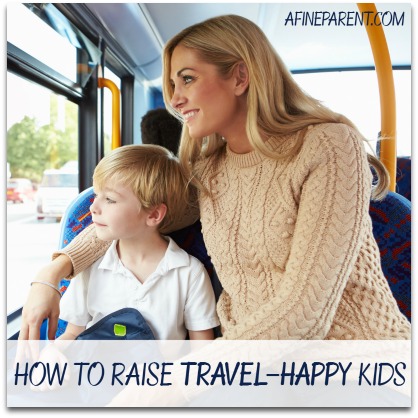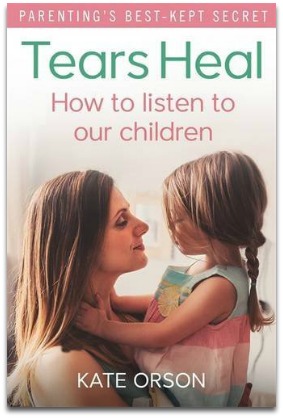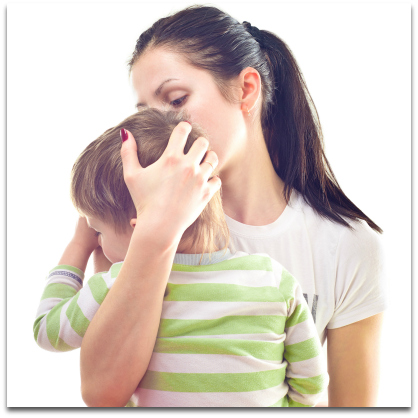 If you’ve been a happy traveler most of your adult life, having children can throw a bit of a complication into the mix. It isn’t so easy to pack a suitcase or backpack and head off at a moment’s notice when you have little ones to think about. We always hear that babies and toddlers thrive on routine, so how can you square that with a life of travel and adventure?
If you’ve been a happy traveler most of your adult life, having children can throw a bit of a complication into the mix. It isn’t so easy to pack a suitcase or backpack and head off at a moment’s notice when you have little ones to think about. We always hear that babies and toddlers thrive on routine, so how can you square that with a life of travel and adventure?
Contrary to popular belief, you can see the world with a child or two in tow. Nowadays, many families explore exotic destinations or even live on the road with their children. As a parenting instructor and mother who has lived and traveled abroad for the last ten years, I know that travelling and parenting are perfectly compatible. Here’s how you can do it, too.
First of all, it’s important to recognize that there is something that your child thrives on much more than routine, and that’s their connection to you.
With the scenery constantly changing, you are your child’s constant. Carrying them in a sling or backpack when they’re little can help them feel secure and safe, where all around them sights and sounds are changing. It also helps them to be adaptable falling asleep wherever and whenever you are.
Routine can often operate as a comfort mechanism for children; they feel safe as long as they fall asleep in their own bed and have dinner at the same time each night. When we travel, it takes children out of their comfort zone. If they are very young, they will have no words to make sense of why their bedroom suddenly has different wallpaper or why the smells are all different. Even children who understand the concept of holidays may struggle to make sense of being far from home.
However, this doesn’t mean that taking children out of their regular routine is a bad thing. In fact, change and adventure can help children build resilience and develop important life skills. The key is simply to understand how children process feelings about change and to be there to connect and listen.
 In my book Tears Heal: How to Listen to Our Children, I explain how crying is a healing process for children–a natural way to release stress and upset. Research has found that there are stress hormones in tears; when we cry, we are literally releasing stress from our bodies.
In my book Tears Heal: How to Listen to Our Children, I explain how crying is a healing process for children–a natural way to release stress and upset. Research has found that there are stress hormones in tears; when we cry, we are literally releasing stress from our bodies.
We as a society are pretty mixed-up about crying.
When we were young, our parents did everything they could to stop us from crying. They would distract us or tell us to stop. We might have been smacked or sent to our rooms. We may have been told “Don’t cry or I’ll give you something to cry about.”
When we become parents, we may be gentler with our children than our parents were with us, but we may still try to get our kids to stop crying. We try to distract them or fix the situation. If our child is crying over the wrong color cup, we’ll give them the right one to calm the storm and avoid the tears.
What often happens when families travel is that the change and newness of travel can trigger a lot of fears in your child.
It’s not that anything’s wrong with going somewhere new, it’s just that a child uses these moments as a trigger for letting go of feelings from the ’emotional backpack’ they’ve been carrying. So that perfect beach holiday is ruined by a toddler who’s complaining the beach is too sandy or cries in fright whenever they go near the waves.
This is what psychologist Aletha Solter calls the ‘broken cookie’ phenomenon. Children often use a small pretext, such as getting upset about a cookie breaking, to let go of big feelings. These bigger feelings might relate to things that happened very early in your child’s life. It could be that they are due to stress in pregnancy, a difficult birth, or medical interventions. What we often don’t consider is that when children exhibit fear about something small like the noise of a hand dryer or a new food, they may have actually experienced real pain and deep fear in their early life that they probably still need to process. Even if your child had a relatively easily start in life, they will still have feelings to process about life’s everyday ups and downs.
When our children start acting off-track or having big meltdowns when we take them on holiday, we might assume it’s because we have taken them out of their routine, and it’s all too much for them.
But before you rush to pack up your stuff and leave that overly sandy beach, here’s something to try when your child has a meltdown.
 It’s called staylistening; a term coined by Patty Wipfler, the founder of Hand in Hand Parenting. It simply means staying in the moment and listening to your child, offering them hugs, eye contact, and a few reassuring words to let them know that they are safe now.
It’s called staylistening; a term coined by Patty Wipfler, the founder of Hand in Hand Parenting. It simply means staying in the moment and listening to your child, offering them hugs, eye contact, and a few reassuring words to let them know that they are safe now.
With staylistening we don’t try to distract our child or immediately jump in to try and ‘fix’ the situation. We also don’t talk too much or try to get our child to ‘use words.’ Instead, we simply allow them to use this natural, healing process for recovering from stress and upset.
And what’s amazing is that when you really allow your child to get to the end of their cry, you’ll often notice a complete change in perspective.
Suddenly the beach isn’t too sandy and is an exciting place to explore. Suddenly those waves aren’t too big, and your child may tentatively dip their toe in.
Making staylistening a regular part of our lives before we go on a trip means that children will adapt quicker to their new surroundings because they don’t have a backlog of heavy feelings to work through. However, meltdowns may still occur on holiday, but taking time for them means an upset might be over in a few a minutes rather than having a cranky toddler that whines for the whole day.
Connection is of primary importance to our children. They are much more interested in feeling deeply heard and connected to us than seeing the Taj Mahal, or even exploring an adventure playground. So, they will let you know when they aren’t feeling well. Any ‘off-track’ behavior such as whining, moaning and aggression is a sign that your child feels disconnected.
When your child starts acting off-track, it’s good to slow down the pace, to spend time following your child’s lead, and doing what they want. Giggles and play, can help release any stress behind their behavior.
Holidays will look a lot different to how they were pre-children. But your child actually offers you a wonderful opportunity to slow down and notice the small things. You might be building endless sandcastles rather than seeing endless sights.
Be realistic about what you expect of your children when you devise a child-friendly travel schedule. Be sure to factor in downtime for big feelings. And when they happen, and you find yourself thinking your child is ruining the trip, remember to focus on the bigger picture. As your child sheds their upset, they’ll have a better perspective and be ready for new adventures.
The 2-Minute Action Plan for Fine Parents
Choose a time each week where you can give your child regular ‘special time.’ Turn off your mobile phone. Set a timer for 10-15 minutes and tell your child it’s special time and that they can choose to do anything they want. If your child is young, still explain what you are going to do, and simply follow their lead even if they are bit young to fully ‘get’ the concept of special time. During special time, simply do whatever your child wants, showering them with attention.
Special time helps to deepen your child’s sense of connection, so they’ll be more able to cope with the change in routine of travel.
The Ongoing Action Plan for Fine Parents
Put a post-it-note on your fridge that says, ‘Tears Heal.’ When your child is on the verge of tears or a tantrum, remember that expressing emotions isn’t necessarily a sign that something is wrong. As Dr. Aletha Solter says, ‘crying is not the hurt but the process of becoming unhurt.’ Take the time to staylisten, and remember that each time you allow your child to get to the end of a big cry at home, you are reducing the likelihood of meltdowns when you hit the road.
Good luck and happy travels!
 Watching tears in our kids eyes is one of the hardest things for any parent. Want to know how best to handle the situation when kids cry? Check out Tears Heal, a book that allows readers to discover parenting’s biggest paradigm shift in the way we respond to our children’s tears. Tears Heal explains how children’s challenging behavior comes from unheard feelings, and how through simple shifts in how we respond to their upsets, our family life will be transformed. The book shows parents how to move away from stopping feelings when they see their kids cry towards listening instead.
Watching tears in our kids eyes is one of the hardest things for any parent. Want to know how best to handle the situation when kids cry? Check out Tears Heal, a book that allows readers to discover parenting’s biggest paradigm shift in the way we respond to our children’s tears. Tears Heal explains how children’s challenging behavior comes from unheard feelings, and how through simple shifts in how we respond to their upsets, our family life will be transformed. The book shows parents how to move away from stopping feelings when they see their kids cry towards listening instead.
Thanks for your insight for your fantastic posting. I’m glad I have taken the time to see this.
https://clickerheroes.games
Some great tips there however please can I encourage you to have travel insurance? It may never happen but what if something does? It could be totally unrelated to your health conditions i.e. a broken arm or your passport and money getting stolen. Please!swim with dolphins kona
I absolutely feel ecstatic when I find articles relevant to my work and my subject.
auto-vox m6
Generally, children are excited to go somewhere different, whether it is visiting grandparents, a vacation or even if you need to get somewhere for a business appointment, you can still turn it into a great adventure.